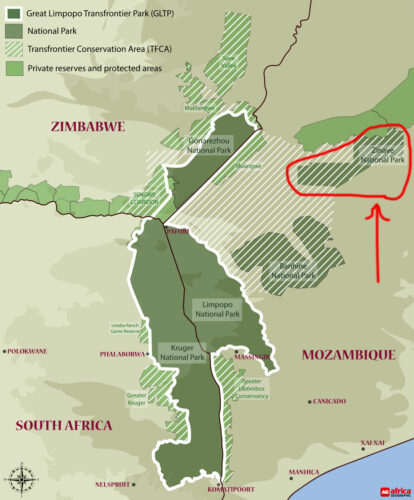A large nomad lion has settled in the remote Zinave National Park, Mozambique, and there is evidence that a lioness has joined him. This extraordinary story of Africa’s apex predator recolonizing a former range is being hailed as a conservation success story.
This park was ravaged during the Mozambique civil war that ended in 1992 and subsequent poaching. Then, ten years ago, an intensive restoration and rewilding programme was launched. The inspirational programme included reintroducing more than 2,300 wild animals (14 species) – including 200 elephants – into a sanctuary within the national park.
A camera trap recently captured the image of this large lion which has since settled in the park, along with his female companion. The photographed lion is a young adult male estimated at 4 to 5 years of age. Male lions are usually pushed out of a pride at between 2 and 3 years old, becoming nomadic and attempting to establish their own territories and prides. The image was taken on a camera trap set up by park warden, Antonio Abacar. The camera trap was set up near the sanctuary fence close to one of the entry gates. Momentarily startled by the flash, the lion charged the source of the disturbance and broke the camera, but fortunately, the memory card remained intact, and the photograph was retrieved.

Incidentally, this momentous occasion comes amid an exciting new phase in Zinave’s translocation programme – the introduction of predators. A clan of four spotted hyenas were settled into the park at the end of 2020 and have already produced two cubs. Two leopards, male and female, were successfully introduced in late 2021.
The populations of reintroduced herbivores have already blossomed to more than 9 000 animals, rapidly restoring the ecological balance in the park and attracting the first free-roaming lions.
Bernard van Lente, Peace Parks Foundation’s Project Manager for Zinave National Park, explains that: “With the abundant prey and safe environment available, the fact that the park can sustain large carnivores is very encouraging, and it will not be too surprising if more lion, leopard, wild dog / African painted wolf and cheetah start to make sporadic appearances, over and above the carnivores that are set for reintroduction in the coming years.”

Zinave National Park is the easternmost anchor park of the Great Limpopo Transfrontier Conservation Area (GLTFCA), which also comprises Banhine and Limpopo national parks in Mozambique, Kruger National Park in South Africa, Gonarezhou National Park in Zimbabwe and various other state and privately-owned conservation areas across the three countries. Wildlife monitoring has shown that multiple species, including lions, elephants, and wild dogs, use this crucial cross-border migration route to access water, food, and breeding grounds through the ecological corridors connecting the different conservation areas.
With the assistance of several donors, the reintroduction programme has been accelerated under a 20-year co-management agreement signed in 2015 between Mozambique’s National Administration for Conservation Areas (ANAC) and Peace Parks Foundation, with the eventual goal of rewilding the entire 408,000 ha park and developing it to sustain its operating costs through ecotourism.
The last hundred years have seen lions disappearing from up to 95% of their historic range. Over 200,000 lions once roamed across Africa’s wild places; now, only an estimated 23,000 to 39,000 mature individuals remain due to habitat destruction, human-wildlife conflict, poaching and poisoning.
Resources
Unlocking the potential of Zinave – read more here
Video – 500 animals journey from Kruger to Zinave – read more here
Illegal logging north of Zinave – read more here

To comment on this story: Login (or sign up) to our app here - it's a troll-free safe place 🙂.![]()






